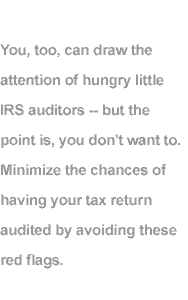|
By 1099 Staff



|
If you do get flagged...
Web sites to check if you're (arrgh!) facing an audit
Internal
Revenue Service
This page of the IRS' own site counsels taxpayers about what to
do when they receive various kinds of letters from the IRS. (Interestingly,
nowhere do they mention the word "audit," although most of the
"notices and letters" in question result from an IRS review of
your tax return.) Also, see the IRS' Taxpayer
Advocate Program.
Metropolitan Life Insurance Company
In the Money section of the "Life Advice Library" is a subsection about IRS audits, including pages called "About an IRS Audit," "What is An Audit?", "What Now?", "Audit Advice," and others. Easy to read, illustrated with Peanuts cartoons.
TaxHawk
The site of CPA and former KPMG accountant Scott Rasmussen, who
is now a member of The Raia Group, "an accounting firm specializing
in individual and small business tax preparation." Gives tips
about how to respond to an audit.
|
|
|
Maybe you think deciphering your bookkeeping and filing your
taxes is tough. Well, it is, sort of, but it's kids' stuff compared
to the big enchilada: getting called on the carpet by the IRS and
asked to explain and defend your tax return. (For those of our
readers outside the US, the Infernal Revenue Service, our beloved tax-collection agency, is one of the
gentle joys of being an American.)
In all fairness, the IRS has a big job to do -- namely, collecting annual dues from those of us who work and live in the United States. Fulfilling this mission means making sure that every taxpayer pays his full share, and the IRS achieves this in part by subjecting suspicious tax returns to a careful and official review, or audit.
The IRS conducted approximately 1.1 million closed books and records audits of individual (i.e., non-corporate) tax returns in the three-year period 1992-1994, exacting from the audited individuals an average additional sum of between $2,000 and $10,000. As if having to pay the additional sum weren't unpleasant enough, people who get audited have to endure the time-consuming and aggravating process of the audit itself. And in an IRS audit, unlike in a U.S. criminal trial, you're guilty until proven innocent. The burden of proof rests with you.
The bottom line, therefore, is that you want to do your best to avoid attracting the notice of IRS agents. Unfortunately, if you file a Schedule C along with your 1040 -- as you probably do if you have 1099 income -- you're more likely to be audited than are people who only have W-2 income. (A September 1997 IRS press release, for example, notes that, in fiscal year 1995, more than three percent of all Schedule Cs reporting between $25,000 and $50,000 of income were audited, compared with about one percent of 1040A returns reporting income in the same range.)
You'd probably rather not get audited. But what, specifically, is
likely to get you audited? Unless you're a masochist, you should
probably take extra care not to mar your return with the following
red flags:
 Deductions. Although Uncle Sam allows for all kinds of deductions, his nephews and nieces at the IRS pay close attention whenever taxpayers claim them. Some kinds of deductions are more questionable than others, and the Home Office Deduction is one of the most frequently contested of all, largely because it's easy to fudge. In order to claim a Home Office Deduction, your home office must, in most cases, be your principal place of business, which means that you do most of your work there. More importantly, you have to use the space exclusively for running your business, and not for personal use as well. Otherwise the space simply doesn't count as a home office and may not be deducted as such. The rules can get pretty specific. Read IRS Publication 587 ("Business Use of Your Home: Schedule C Example) for the IRS' own explanation of what's permissible and what isn't. Deductions. Although Uncle Sam allows for all kinds of deductions, his nephews and nieces at the IRS pay close attention whenever taxpayers claim them. Some kinds of deductions are more questionable than others, and the Home Office Deduction is one of the most frequently contested of all, largely because it's easy to fudge. In order to claim a Home Office Deduction, your home office must, in most cases, be your principal place of business, which means that you do most of your work there. More importantly, you have to use the space exclusively for running your business, and not for personal use as well. Otherwise the space simply doesn't count as a home office and may not be deducted as such. The rules can get pretty specific. Read IRS Publication 587 ("Business Use of Your Home: Schedule C Example) for the IRS' own explanation of what's permissible and what isn't.
 Inconsistencies between your new return and last year's. For example, if you changed your name (from, say, John Doe to The Taxpayer Formerly Known as John Doe), or your spouse or your children changed their names, or if you're suddenly taking new types of deductions, the IRS is likely to notice and inquire about them. Inconsistencies between your new return and last year's. For example, if you changed your name (from, say, John Doe to The Taxpayer Formerly Known as John Doe), or your spouse or your children changed their names, or if you're suddenly taking new types of deductions, the IRS is likely to notice and inquire about them.
 Disagreements between your state and Federal tax returns. If you told the state treasury that you earned $50,000 last year, don't tell the Feds that you earned $52,000 or $49,000 or even $50,001. They'll wonder why you did, and then ask. The potential for discrepancies lies elsewhere as well. Remember that, as a contractor, you receive 1099s from all the people who paid you -- at least in theory. And when clients send you a 1099, they also send a copy to the IRS. If you report gross income that's less than the total amount indicated by all the 1099s submitted with your name on them, you run a high risk of being audited. (Yes, state and Federal tax authorities do share and compare data.) Disagreements between your state and Federal tax returns. If you told the state treasury that you earned $50,000 last year, don't tell the Feds that you earned $52,000 or $49,000 or even $50,001. They'll wonder why you did, and then ask. The potential for discrepancies lies elsewhere as well. Remember that, as a contractor, you receive 1099s from all the people who paid you -- at least in theory. And when clients send you a 1099, they also send a copy to the IRS. If you report gross income that's less than the total amount indicated by all the 1099s submitted with your name on them, you run a high risk of being audited. (Yes, state and Federal tax authorities do share and compare data.)
 Drastic changes in income. If you took in $50,000 last year, but report that you earned only $15,000 this year, the IRS will ask, "What the hell happened? Where's the money? Under your mattress? Up your butt?" Flashlight in hand, the IRS will look. Drastic changes in income. If you took in $50,000 last year, but report that you earned only $15,000 this year, the IRS will ask, "What the hell happened? Where's the money? Under your mattress? Up your butt?" Flashlight in hand, the IRS will look.
 Round numbers, like "$3,000." These don't occur much in everyday life, and if your return is sprinkled with them, IRS agents will take notice. Round numbers, like "$3,000." These don't occur much in everyday life, and if your return is sprinkled with them, IRS agents will take notice.
 Incomplete or sloppy returns. Don't leave any blanks where you should really leave numbers. Also, don't dash off your return with a blunt and chalky number-2 pencil; use a typewriter or a computerized tax-filing program like Intuit's TurboTax (for PCs) or MacInTax (for Macs). Otherwise you might end up translating your return -- in person. Incomplete or sloppy returns. Don't leave any blanks where you should really leave numbers. Also, don't dash off your return with a blunt and chalky number-2 pencil; use a typewriter or a computerized tax-filing program like Intuit's TurboTax (for PCs) or MacInTax (for Macs). Otherwise you might end up translating your return -- in person.
 Suspiciously low income. If your tax return indicates that you, your spouse, and four dependents live on Rodeo Drive in Beverly Hills on an income of only $18,312, agents will marvel at your ability to stretch a dollar -- and call you in for an explanation. In short, the IRS might question the accuracy of any return that shows both a low income and considerable financial obligations. Suspiciously low income. If your tax return indicates that you, your spouse, and four dependents live on Rodeo Drive in Beverly Hills on an income of only $18,312, agents will marvel at your ability to stretch a dollar -- and call you in for an explanation. In short, the IRS might question the accuracy of any return that shows both a low income and considerable financial obligations.
Most of the tax returns chosen for audit in a given year are chosen by a computer looking for returns likely to yield big bucks for the Federal Government, not by people trained to spot red flags, so maybe all this extra vigilance isn't worth it. On the other hand, do you really want to bet against the computers? Wouldn't you feel like an ass if you had to endure an income tax audit because you were too busy oiling your Weed Whacker to fill in the forms properly?
|



